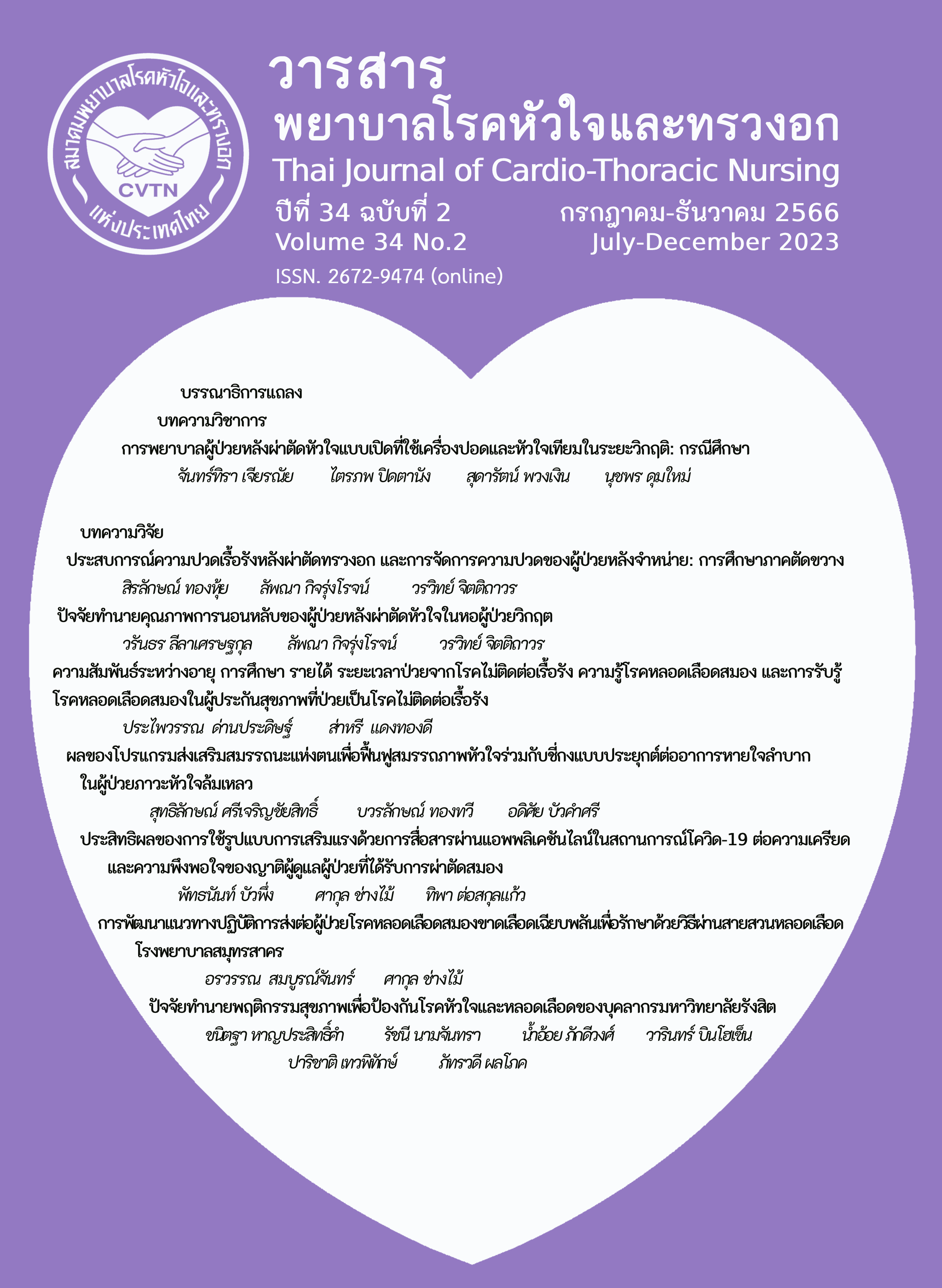Factors predicting health behaviors for cardiovascular disease prevention among Rangsit University personnel
Keywords:
cardiovascular disease preventive health behaviors, university personnel, health literacy, health promotionAbstract
This predictive study aimed to investigate the factors predicting cardiovascular disease preventive health behaviors among 365 Rangsit University personnel who had an annual health check-up in 2021. Samples were selected via stratified random sampling. Data was collected by using questionnaires including the Personal Data Record Form, Health Literacy Scales, Questionnaires of Perceived benefit, Perceived barrier, Perceived Self-efficacy, Activity-related affect, Social support, and Situation influences in performing health behaviors for cardiovascular disease prevention, and Health behaviors for cardiovascular disease prevention questionnaire. Data were analyzed using descriptive statistics and stepwise multiple regression analysis.
Results revealed that the sample had the mean scores of health behaviors in cardiovascular disease prevention, health literacy, perceived self-efficacy, social support, and situation influences in performing health behaviors for cardiovascular disease prevention at moderate levels. They perceived benefits and activity-related effects at a high level, whereas perceived barriers at a low level. Predictors of health behaviors for cardiovascular disease prevention including perceived self-efficacy, health literacy, activity-related affect, and perceived benefit were significant predictors (β = 0.427, p < 0.001; β = 0.194, p < 0.001; β = 0.207, p < 0.001; and β = 0.091, p < 0.05, respectively). These four variables could explain 52.2% of the variance in health behaviors for cardiovascular disease prevention (p < 0.001).
Suggestions from this study include the institute creating health promotion activities for promoting self-efficacy, health literacy, activity-related effect, and perceived benefit for university personnel in performing health behaviors for cardiovascular disease prevention.
References
Virani SS, Alvaro AA, Benjamin EJ, Bittencourt MS, Callaway CW, Carson AP, et al. Heart disease and stroke statistics 2020 update: a report from the American Heart Association. Circulation. 2020; 141: e139-e596. doi:10.1161/CIR.0000000000000757
Karnkawinpong O. Department of disease control joined the campaign for world heart day on 29 September 2022. [homepage on the Internet] 2022 [cited 2022 Oct 30]. Available from: hfocus.org/content/2022/09/26061. (in Thai).
Phongphaitoonsin N, Nomsiri A, Kongsupon N. Health behaviors and health promotion management guidelines for supporting staffs in Faculty of Medicine, Thammasat University. Thai Journal of Public Health and Health Sciences. 2020; 3(2): 95-108. (in Thai).
Srijaroentham S, Supapong S, Rattananupong T, Aekplakorn W, Vathesatogkit. Cardiovascular risk factors among blue- and white-collar employees in an enterprise. Chula Med Bull. 2019; 1(1): 27-36. (in Thai).
Nutbeam D. The evolving concept of health literacy. Soc Sci Med. 2008; 67(12): 2072-8.
Cho YI, Lee SY, Arozullah AM, Crittenden KS. Effects of health literacy on health status and health service utilization amongst the elderly. Soc Sci Med. 2008; 66(8):1809-16.
Kareesun K, Malathum P, & Sutti N. Relationships among health literacy, knowledge about hypertension control, and health behavior in older persons with hypertension. Rama Nurs J. 2019; 25(3): 280-95. (in Thai).
Murdaugh CL, Parsons MA, & Pender NJ. Health promotion in nursing practice. 8th Edition. New Jersey: Pearson Education Inc.; 2019.
Fakkeaw J, Boonchieng W, Juntasopeepun P. Factors related to health-promoting bevaviors among andropause in community. Nursing Journal. 2019; 46(3): 130-41. (in Thai).
Puttametha C, Namjuntra R, Hanprasitkam K. Associations between the perception of health-behavioral practice, social support, and health behaviors for cardiovascular diseases prevention of a private university staff at risk of diabetes mellitus. Thai Journal of Cardio-Thoracic Nursing. 2022; 33(1): 183-200. (in Thai).
Supruang J, Viriyaratanakul B, Sungwan P. Predicting factors of health promoting behaviors among work-age adult with metabolic syndrome. Journal of Social Science and Buddhistic Anthropology. 2021; 6(8): 386-99. (in Thai).
Norwood SL. Research strategies for advanced practice nurses. Upper Saddle River, New Jersey: Prentice-Hall, Inc.; 2000.
Chontichachalalauk J. Translation and evaluation of the version of the diabetes numeracy test for older adults with type 2 diabetes. (Unpublished doctoral dissertation). The University of Texas at Austin, the United States; 2015.
Hair FJ, Black CW, Babin JB, Anderson ER. Multivariate data analysis. 7th Edition. New Jersey: Person Education; 2010.
Ploysub A, Kaewpan W, Pichayapinyo P, Silabut J. Factors affecting cardiovascular disease prevention behaviors among a high risk group in Samutprakan province. Journal of Health Science Research. 2018; 12(2): 49-58. (in Thai).
Hongkrajok H. Influences of health literacy, perceived self-efficacy, and patient-health care provider communication on self-care behaviors among patients with primary hypertension. (Unpublished Master Thesis Adult Nursing). Chonburi: Burapha University; 2016. (in Thai).
Mohsenipoua H, Majlessi F, Shojaeizadeh D, Rahimiforooshani A, Ghafari R, Habibi V. Predictors of health-promoting behaviors in coronary artery bypass surgery patients: an application of Pender’s health promotion model. Iran Red Crescent Med J. 2016; 18(9): e38871.
Sutthipatthanangkoon C, Thato R. Factors predicting preventive behaviors for coronary artery disease among autonomous university staff in Bangkok. Thai Journal of Cardio-Thoracic Nursing. 2017; 28(2): 111-25. (in Thai).
Kerdin M, Kittipimpanon K, Tantiprasoplap S. Association between health literacy, self-care behaviors, and clinical outcomes among people with chronic kidney disease in primary care units. Journal of Thailand Nursing and Midwifery Council. 2023; 38(2): 64-76. (in Thai).
Darun P, Khunpijan N. Factors affecting health literacy and health behavior outcomes of working-age population in Porncharoen district, Bueng Kan province. DPC 9 J. 2016; 22(1): 14-24. (in Thai).
Downloads
Published
How to Cite
Issue
Section
License
Copyright (c) 2024 Thai Journal of Cardio-Thoracic Nursing

This work is licensed under a Creative Commons Attribution-NonCommercial-NoDerivatives 4.0 International License.
บทความนี้ยังไม่เคยตีพิมพ์หรืออยู่ในระหว่างส่งไปตีพิมพ์ในวารสารอื่น ๆ มาก่อน และกองบรรณาธิการขอสงวนสิทธิ์ในการตรวจทาน และแก้ไขต้นฉบับตามเกณฑ์ของวารสาร ในกรณีที่เรื่องของท่านได้ได้รับการตีพิมพ์ในวารสารฉบับนี้ถือว่าเป็น ลิขสิทธิ์ของวารสารพยาบาลโรคหัวใจและทรวงอก






